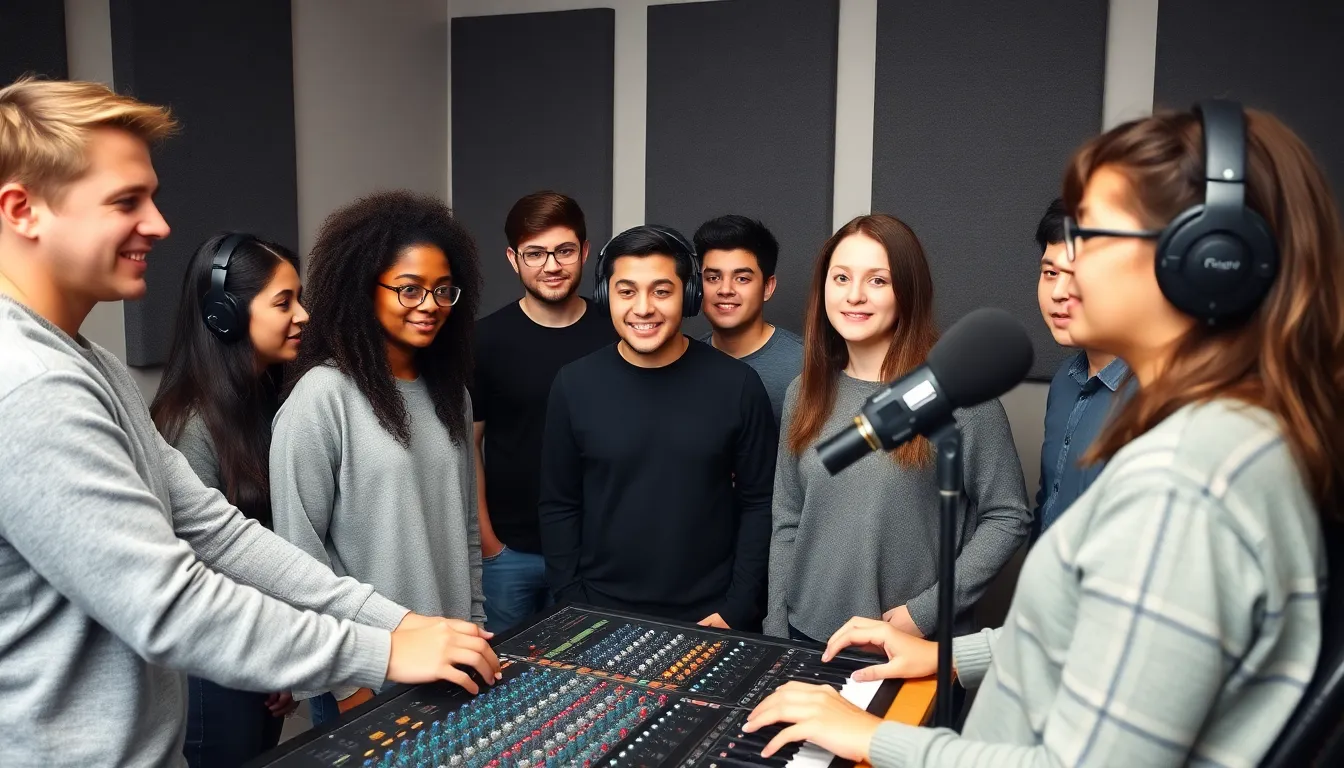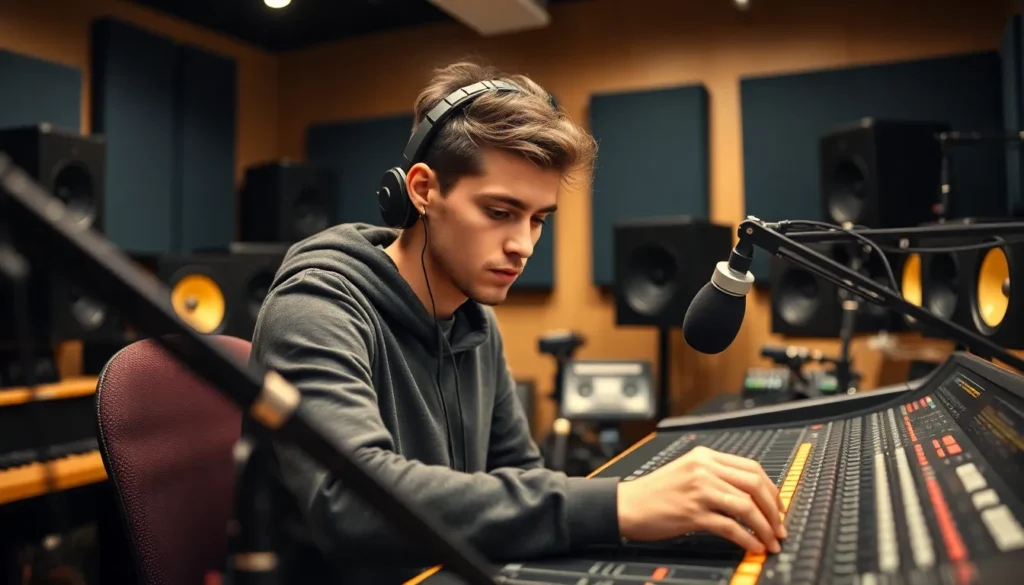Table of Contents
ToggleIn a world where music is the heartbeat of every moment, audio engineering schools are the secret labs where sound wizards are born. Imagine transforming your passion for music into a career that lets you mix, master, and manipulate sound like a pro. Whether it’s crafting the perfect track or ensuring that every note hits just right, these schools offer the keys to unlock a symphony of opportunities.
Overview of Audio Engineering Schools
Audio engineering schools provide essential training for individuals seeking careers in sound production. These institutions focus on various aspects of audio technology, including mixing, mastering, and recording. Aspiring engineers learn about sound design, acoustics, and the latest software used in the industry.
Programs typically offer hands-on experience in professional studios, allowing students to apply their knowledge in real-world settings. Courses often cover topics such as signal flow, audio effects, and digital audio workstations (DAWs). Students explore the technical and creative dimensions of sound, preparing them for diverse roles in the industry.
Certification and degree options vary across institutions. Associate degrees, bachelor’s degrees, and diploma programs exist to cater to different levels of knowledge and commitment. Accreditation ensures that schools meet specific educational standards, improving employment prospects for graduates.
Career opportunities abound for those who complete audio engineering programs. Graduates can pursue roles such as audio engineers, sound designers, and mixing specialists. The skills acquired in these schools enable individuals to work in film, television, music, and live sound environments. Networking opportunities through internships and industry exposure enhance their chances of securing employment.
Overall, audio engineering schools play a crucial role in developing skilled professionals ready to navigate the music and sound industry. These institutions equip students with the technical skills and creative insights needed for success.
Factors to Consider When Choosing a School

Choosing an audio engineering school involves several vital considerations. Selecting the right institution can significantly impact a student’s future in the music industry.
Accreditation and Reputation
Accreditation plays a crucial role in assessing a school’s credibility. Look for institutions recognized by reputable accrediting bodies, as this ensures adherence to quality educational standards. Graduates from accredited schools may enjoy enhanced job prospects since employers often prefer recognized programs. Reputation also ties into alumni success. Researching how past students have fared in the industry can provide insight into a program’s effectiveness. A school with strong connections to industry professionals often offers valuable networking opportunities, which can lead to internships and job placements.
Curriculum and Specializations
Reviewing the curriculum and specializations is essential when choosing a program. Comprehensive courses cover key areas such as sound design, mixing techniques, and acoustics. Programs offering specialized tracks, such as music production or audio post-production, cater to specific interests and career goals. Hands-on experience in studios is often included, allowing students to apply theoretical knowledge in practical settings. Evaluating the availability of the latest industry software in the curriculum is also important, as familiarity with current tools enhances employability. Students benefit from learning in environments that mimic real-world scenarios, preparing them for various roles within the audio engineering field.
Top Audio Engineering Schools in the US
Several esteemed audio engineering schools in the US prepare students for dynamic careers in the music industry. These institutions offer rigorous programs designed to equip aspiring audio professionals with essential skills.
School A: Program Highlights
School A features a comprehensive curriculum focused on both theoretical and practical aspects of audio engineering. Students engage with industry-standard equipment and software, gaining hands-on experience in state-of-the-art studios. Core subjects include sound design, acoustics, and mixing techniques. Additionally, networking opportunities with industry professionals enhance learning experiences, helping students establish important contacts in the field. Accreditation ensures that graduates meet recognized standards, boosting their employability in a competitive job market.
School B: Unique Features
School B stands out due to its unique approach to audio education, emphasizing creativity alongside technical skill development. Specialized courses in areas like post-production and live sound provide targeted training for diverse career paths. Students benefit from one-on-one mentorship from experienced instructors, fostering individualized learning experiences. Furthermore, partnerships with local music venues offer real-world exposure, allowing students to practice their craft in live environments. This blend of hands-on training and professional mentorship positions graduates for success in various audio engineering roles.
Pros and Cons of Attending Audio Engineering Schools
Attending audio engineering schools offers various advantages and disadvantages for aspiring audio professionals.
Pros
- Skill Development: Students acquire essential skills in mixing, mastering, and sound design, which are vital for a successful career.
- Hands-on Experience: Many programs provide access to professional studios, enabling practical learning through real-world applications.
- Networking Opportunities: Schools often facilitate connections with industry professionals, increasing the chances of securing internships and job placements.
- Accredited Programs: Graduating from recognized institutions enhances credibility and employability within the competitive job market.
- Comprehensive Curriculum: Courses cover key areas like acoustics and digital audio workstations, ensuring a well-rounded education.
Cons
- Cost of Attendance: Tuition fees can be significant, often leading to substantial student debt.
- Time Commitment: Programs typically require a substantial time investment, ranging from several months to years, which may delay entry into the workforce.
- Variable Job Market: The music industry can be unpredictable, and job availability may fluctuate depending on location and economic conditions.
- Potential Skill Gaps: Some programs might not keep pace with rapidly evolving technology and trends, leading to gaps in knowledge for graduates.
- Competition: Graduates often face stiff competition from peers and self-taught individuals who may have equal or comparable skills.
Evaluating these pros and cons helps prospective students make informed decisions about pursuing education in audio engineering.
Career Opportunities After Graduating
Graduates from audio engineering schools find themselves in diverse career paths. Audio engineers operate in recording studios, ensuring sound quality for various projects. Sound designers create unique audio experiences for films, video games, and advertisements. Mixing specialists enhance soundtracks by balancing audio elements for clarity and richness.
Employment opportunities extend beyond traditional music venues. Graduates work in television production, providing sound design and audio editing for broadcasts. Live sound engineers manage audio equipment for concerts and events, maintaining sound quality in dynamic environments. With the growth of digital media, opportunities in podcasting and online content creation also increase.
Networking plays a critical role in securing jobs. Internships offer practical experience and connections to industry professionals. Participation in industry events enhances visibility and opens doors to collaborations. Building relationships during school can lead to job offers post-graduation.
Advancements in technology broaden possibilities. Skilled individuals can specialize in areas like acoustics or virtual reality audio. Positions in music licensing and audio post-production add further depth to career choices. Emerging fields like music technology and interactive media provide additional avenues for creativity.
Graduates can explore freelance work as well. Freelancers enjoy flexibility in their projects and clientele. Many build personal brands, using social media to showcase their work. This path allows for varied experiences across different sectors.
Overall, audio engineering education equips students with the skills needed for success in a variety of roles. Its comprehensive focus on both technical and creative aspects prepares individuals for the challenges of the ever-evolving audio industry.
Choosing the right audio engineering school can significantly impact an aspiring professional’s career trajectory. With the right training and hands-on experience, graduates are well-equipped to navigate the diverse opportunities within the music and sound industry.
As they develop both technical skills and creative insights, they position themselves for success in various roles. It’s essential for prospective students to carefully consider factors like accreditation, curriculum, and networking opportunities when selecting a program.
Ultimately, a solid education in audio engineering not only enhances employability but also fosters a lifelong passion for sound and music.







